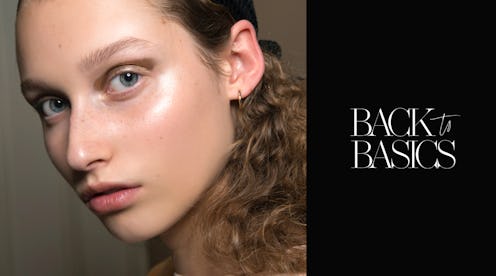(Beauty)
Everything You Need To Know About Hyaluronic Acid

With new product brands, launches, and categories popping up every day, beauty can be a bit overwhelming. Back to Basics, our new rudimentary beauty series, serves as your crash course on the science behind some of the best formulations in the game.
The name sounds scary — even borderline aggressive — but the reality is that hyaluronic acid in skincare is one of the most gentle, pampering ingredients in the game, and the one responsible for helping you achieve those glowy, dewy, luminous results we all long for. The reason being, it’s a hydrating all-star that holds 1,000 times its weight in water, helping skin look and feel brighter, softer, smoother, plumper, and just all around better. Whether you’ve heard about, read about, slathered it on this morning, or are soaking up this brand new information for the first time, we consulted a group of skincare experts to bring us back to the basics and explain why hyaluronic acid is the MVP of your skincare routine.
For starters, hyaluronic acid (HA) is a sugar that our bodies produce naturally and is found in the highest concentrations in our skin, connective tissue, and eyes. It main function is to retain moisture, creating a plumping effect that keeps our tissues well lubricated and skin looking smoother and firmer. “Think of it like the padding of your mattress,” Dr. Joshua Zeichner, MD, Director of Cosmetic & Clinical Research in Dermatology at Mount Sinai Hospital in New York City, tells TZR. “Hyaluronic acid is a humectant. This means that it draws water to it, while simultaneously helping the skin hold onto water,” Dr. Jennifer Chwalek, M.D. of Union Square Laser Dermatology in New York City tells TZR. With an increased ability to hold onto moisture, skin appears smoother, firmer, and all around better, which is certainly something we can all get behind.
“Because hyaluronic acid can hold 1,000 times its weight in water, it's integral in helping to keep your skin hydrated and plump,” Dr, Papri Sarkar, M.D., a Massachusetts-based dermatologist, tells TZR. It not only helps to retain the moisture in your skin and joints, but it also prevents the moisture from evaporating. As a result, hydrated skin has more rapid cell turnover, which in turn improves collagen production and overall skin health and appearance. “When used in skincare products like creams and serums, hyaluronic acid helps attract moisture,” Dr. Ranella Hirsch, M.D., a Boston-based dermatologist, notes.
Like any good MVP, hyaluronic acid plays well with most ingredients in your skincare and beauty lineup. "It's a great ingredient to use in a multi-step regimen because you can easily layer it under your other products,” Zeichner explains. It’s the ultimate multitasker that hydrates, improves radiance, and blurs the appearance of fine lines and wrinkles. “It’s also extremely versatile across all skin types, being effective in moisturizing dry skin and won't weigh down oily skin,” he adds. But before you go slathering your best hyaluronic acid-spiked moisturizer on, take a tip from the experts: Apply to slightly damp skin. “Think of the ingredient like a sponge which binds to and attracts water to the outer skin layer," he notes. "It is best applied to damp skin or using damp fingertips." This allows the hyaluronic acid to absorb moisture into the skin and increase overall hydration for that supple, dewy result.
But it’s not all butterflies and rainbows. Hyaluronic acid does pose a challenge in formulation as it’s a very large molecule that’s not easily absorbed by the skin. “The concern with products has been how to formulate it so that it will be able to get absorbed in the skin,” Chwalek explains. “To combat this, some skincare companies use shorter chain acids and sodium hyaluronate — like those found in Charlotte Tilbury's Magic Cream — to increase the chance of them penetrating the skin barrier,” Sarkar adds. This makes the formulation very important. “Every hyaluronic acid product may not be equivalent in efficacy, specifically in terms of its ability to get absorbed by the skin,” Chwalek says. Her expert pick: Skin Medica 5HA Rejuvenating Hydrator. “It has a silky texture and contains five types of hyaluronic acid including forms that result in immediate hydration, time-released hyaluronic acid, and a cross-linked form for long-lasting hydration.” Another route, for those brave enough for needles, is fillers. “Injecting it directly into the skin bypasses the barrier function of the skin,” notes Sarkar. “In fact, the most common fillers that are used in the U.S. are made out of hyaluronic acid because it plumps so well.”
Hyaluronic acid also plays a key role in wound healing. “It helps to decrease inflammation which controls blood vessel development in a wound to help it heal and lessen scar development,” Dr. Jason Emer, M.D., a Beverly Hills-based cosmetic dermatologist, tells TZR. While the acid is naturally present in the skin, "genetics, the natural aging process, and environmental exposure to conditions like sun, pollution, and smoke can decrease the quantity in the skin," he explains. This is why when you have a sunburn, irritation, or cosmetic treatment, applying hyaluronic acid can help speed up the recovery process. “It has antibacterial properties and can speed up healing and prevent infection when applied to cuts and scratches,” Emer adds.
No matter if your skincare routine mimics something of a ritual with the stacked shelfie to prove it, or the most minimalistic lineup known to man, if your goal is to achieve glowy, supple, hydrated skin, hyaluronic acid deserves a spot in your starting lineup.
We only include products that have been independently selected by The Zoe Report’s editorial team. However, we may receive a portion of sales if you purchase a product through a link in this article.
This article was originally published on